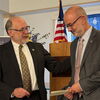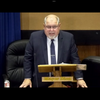Outgoing PUC Chairman Tom Welch reflects on 15 years guiding energy policy in Maine
 Photo / Russ Dillingham
Tom Welch, outgoing chairman of the Maine Public Utilities Commission, in his Hallowell office. Welch oversaw the deregulation of Maine's electricity industry and is widely regarded as an expert on energy policy in New England.
Photo / Russ Dillingham
Tom Welch, outgoing chairman of the Maine Public Utilities Commission, in his Hallowell office. Welch oversaw the deregulation of Maine's electricity industry and is widely regarded as an expert on energy policy in New England.
Tom Welch's departure as chairman of the Maine Public Utilities Commission on Dec. 31 — two years before his term was set to expire — removed a highly regarded utility regulator at a critical moment when rising electricity costs and a regional natural gas “bottleneck” are creating additional economic uncertainty for Maine businesses.
Nominated by Gov. Paul LePage in March 2011, Welch previously served two terms as PUC chairman from 1993 to 2005, when he played a leading role in the restructuring of Maine's electric utility industry. He's been supportive of expanding natural gas lines in Maine and the region. His legacy over 15 years as a utility regulator cuts across virtually every business sector in Maine — including telecommunications rate cases, water utility mergers and efforts to jump-start an offshore wind industry in the Gulf of Maine.
Welch's departure also came two months before PUC Commissioner David Littell's term is set to expire in March. Littell, former head of the Maine Department of Environmental Protection and a 2010 appointee of former Gov. John Baldacci, has tended to be more supportive of renewable energy initiatives than LePage, who has the option to reappoint Littell to another term — or pick someone more aligned his to his energy policy. Mark Vannoy, another LePage nominee who was appointed to commission in 2012, rounds out the three-member commission.
Two members of LePage's staff have been identified as possible PUC nominees: Patrick Woodcock, director of the Governor's Energy Office, who served as senior advisor to the U.S. Sen. Olympia Snowe on energy and environmental issues prior to his appointment and has pushed several LePage initiatives to lower energy costs; and Carlisle McLean, the governor's chief legal counsel, who practiced law with the Portland law firm Preti Flaherty from 2005 to 2011, focusing on cases involving compliance of energy and development permits as well as Land Use Regulation Commission rezoning and development permits.
In an hour-long interview at the PUC's headquarters in Hallowell in December, Welch declined to speculate on who might replace him and what it might mean for the state's future energy policies. He focused, instead, on what he regards as the state's overriding energy challenge: expanding the supply of natural gas in New England.
“I'm retiring two years early, for entirely personal reasons,” Welch, 65, told Mainebiz. “As I've said to others, [laughing], 'I'm older than I thought I would be at this age.' That's just one of several factors. Frankly, it might be time to get some different 'brains' here to work on these issues.”
The following is an edited transcript of our interview with Welch.
Mainebiz: You've been credited, in your previous tenure as PUC chairman, with being one of the architects of deregulation of Maine's electricity industry in the 1990s.
Tom Welch: Or 'restructuring,' as we prefer to call it.
MB: Fair enough. Has restructuring achieved its goals? And if it isn't, is there anything that should be done that might not have been evident in 2000 when Maine's electric utilities sold their generating assets to focus solely on power transmission?
TW: The answer is, partly, yes. I think Maine's restructuring law is probably the best in the country. The process by which the law was developed and enacted was exceptionally transparent and robust. So I think Maine's law got a lot of things right — in terms of what should be given to the competitive market to address and what should be continued under regulation [and] also in terms of the relationships among the players in the market and the way in which the standard electricity rate offer is set up.
One of the things that restructuring achieved quite well is shifting a great deal of the risk of investment away from customers onto the private side … The infrastructure that's been put in place, the market interest in the kinds of retail products that restructuring encourages — such as real-time pricing, smart meters and things of that nature — are some of the benefits we've seen.
On balance, then, I think it's achieved some of the results that were envisioned. But, I also think, it needs more work to achieve all of them.
At the time restructuring was implemented, Maine's electricity prices had managed to wander some distance above the national average. And the goal was to bring them back down to the national average. I think, were it not for the natural gas pipeline constraint into New England, we would be very close to that goal. In fact, we got very close to it in 2012 and then, for winter pricing reasons, we've departed from it again.
MB: Would you agree that there's some confusion in Maine about why the price of natural gas is so much higher here than it would be, say, in Pennsylvania? Why is that?
TW: If you're buying natural gas in Maine, it's a complicated question. For example, if you are buying from a Maine gas utility that has a long-term pipeline contract, their customers don't see the 'basis differential' as much of a problem. You see it much more dramatically in the electricity prices, because the electricity generators don't have the long-term contracts, so they're buying it on the spot markets. So when the pipelines are full, typically on cold days, there's a huge premium to be paid for the gas that they buy. And that gets translated into higher electricity prices.
MB: The latest ISO-New England forecast indicates that problem could get worse — and that it will drive up electricity prices — if the natural gas bottleneck isn't addressed.
TW: I think that's probably true. Other factors [driving the cost of electricity in the region] are the closure of Vermont Yankee nuclear power plant and the closure of Brayton Point [a coal-fired power plant in Somerville, Mass.] expected in 2017.
What would ameliorate the problem is warm weather, which is not under our control.
The other thing that will make it better, in about two or three years, is that there is some additional capacity coming on in the Algonquin Incremental Market (AIM) Project [a Spectra Energy project that expands the pipeline capacity of the existing Algonquin Gas Transmission system] and the smaller Tennessee-Connecticut project. …
There is a potentially ironic, and in some senses a tragic, self-fulfilling prophecy here, which is: If you don't solve the problem, you will reduce load, because you will lose your economic base. That would not be, in my view, a sensible or responsible way to address the problem. I find it hard to believe that New England will be willing to 'export' $3 billion a year [due to higher energy costs resulting from the natural gas bottleneck] due to a failure in political will.
MB: Under the Omnibus Energy Bill approved by lawmakers this past spring, wasn't there a provision that would allow the PUC to assess a tariff on electricity ratepayers to pay for new pipeline capacity?
TW: That's what the law contemplates.
MB: So, it's just a proposal?
TW: That's correct. The Omnibus Energy Bill would permit the commission, under certain circumstances, to write a bill that would require electricity customers basically to pay for gas pipeline infrastructure — not the local infrastructure but the regional pipeline infrastructure.
MB: Are the other New England states also considering adopting the same provision for their electricity ratepayers? Otherwise, wouldn't we be at risk of having Maine ratepayers pick up the tab for the regional pipeline expansion?
TW: That's exactly right. That's what makes the Maine calculation very complicated. In the worst case, you end up paying 100% of the cost for 8% of the benefit. So that is really what caused Maine to try to put together a regional solution, in the first place. It clearly works best if New England works together. It might not work if Maine goes alone, but that's the question before the commission right now.
I think the decision of whether or not to go forward with something specific in Maine will be made in the first half of 2015. I think the question of whether there's a regional approach that works, in which Maine would participate one way or another, is probably also in the same time frame. But those things always take a bit longer than I think they will.
MB: Weren't the New England governors also exploring how to access Hydro-Quebec power? What are your thoughts on that?
TW: That was part of the discussion and, to some extent, remains part of the discussion. Whether that will continue to remain as part of the package I really don't know.
The value of accessing major hydro-power resources in Canada, when we have resources in Maine, is mostly on the environmental side: basically, it would increase the percentage of 'zero carbon' electricity generation. The gas pipeline issue is very substantially an economic and a reliability issue, because it would certainly improve the reliability of supply being available when the demand is highest. You are basically reducing the cost of the fuel that's needed to generate electricity. And you're also reducing the cost of the fuel that essentially sets the price of electricity.
With something like Hydro-Quebec — or the Nalcor Energy project, which is a big Newfoundland-Labrador project — although it's cheap for them to produce it, they are not going to sell hydro-power to us at their production cost.
MB: And that's because it's a commodity?
TW: Exactly. They're going to sell it to us at the price that they expect [they can get]. Paradoxically, the price they would get in the market is a function of the natural gas price in New England.
MB: So, to get the lowest possible price for that Canadian hydropower, we would need to lower the cost of natural gas flowing into New England first?
TW: Exactly. I encourage people to think about the following proposition: If you are serious about trying to buy significant additional 'zero carbon' resources from Canada, it will be cheaper for you to do that if you solve the natural gas problem. Otherwise, if you don't, they'll charge you a much higher price for that hydropower.
So the particular questions for getting additional power from Canadian and northern Maine resources are: How much additional transmission do you have to build? And what's the cost going to be, against the benefits?
MB: Offshore wind is another big issue you've grappled with. What's your perspective?
TW: For a variety of reasons, I felt it was a good idea to see if Maine could be developed as a center of expertise and experience in terms of offshore wind power, which the UMaine pilot project would give us some ability and opportunity to do. The question of whether there really is a viable opportunity in the next 20 or 30 years for a major offshore wind power project, that's a very hard question to answer. I actually think it's made much more difficult by the low cost of Marcellus Shale natural gas, because it means offshore wind's ability to reach a competitive price against the market will be that much harder to hit.
MB: How would you characterize Maine's onshore wind power industry's prospects?
TW: I think continued development is likely. Maine has a good wind resource. The question of whether Maine can and should exploit that wind resource depends a little bit on the question of what Maine should be selling to the rest of the world? If you are selling pristine landscapes, you need to think about where you want to put those wind turbines.
On the question of cost, it's true the cost curves are coming down for onshore wind power. But you also have to look at whether the cost curves are coming down for the other energy sources as well.
MB: Any closing thoughts or comments?
TW: I think the winter-time price spike for electricity that we are currently experiencing, which started last winter and will continue for a little while longer, is and will be challenging. I think businesses, in particular, will need to look at what they can do — for example, how they produce things; the products they buy on the market; the efficiency measures they put in — to moderate the effects that I think will persist for a few years. Those effects will be less if we have a warm winter, more if we have a cold winter, for the next two, three or four years.
But I think the longer-term picture is quite positive, because we are close to what is literally the cheapest source of fuel in the world. The Marcellus Shale production of natural gas is cheaper than anywhere else in the world.
I think in the long term, by which I mean four-plus years out, there's a very good and strong possibility we will be in an advantageous position. What I'm hoping for is that businesses, either in their board rooms in Maine or board rooms elsewhere, will see the continued value of Maine as a place where people want to live and work and produce things. I'm hoping they don't give up and say, 'Oh, we're just going to take it someplace else.' I genuinely believe this is a two-, three- or four-year blip. So that's the underlying message.
MB: Any advice to whoever succeeds you?
TW: Read carefully, ask questions when they need to be asked and treat staff with the respect they deserve and make sure you press them for the information you need.
I think it's also important to understand that very few things happen quickly in this industry. You've got to pay attention to the economic fundamentals and always step back and think, 'What are the effects going to be? What are the implications going to be?' You need to be fair, and perceived to be fair. You know, reasonable minds can differ, but you have to be sure that what you are saying is the expression of a reasonable mind.
Read more
SunEdison finalizes First Wind buyout
Maine Senate confirms PUC nominee
With PUC reshuffle, 2 wind projects up in the air
PUC to reconsider two wind projects
PUC panned for cutting energy efficiency funds
PUC vote could endanger heating program
GOP leader seeks to overturn PUC decision
PUC's last Baldacci appointee to stay on
SunEdison cites PUC as reason for ending wind energy talks










Comments